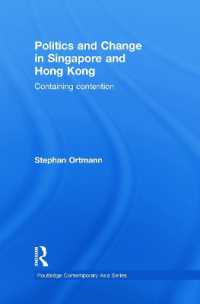- ホーム
- > 洋書
- > 英文書
- > Politics / International Relations
Full Description
Central Asia often evokes images of imperial power rivalry dating back to the 19th century. Yet as the region's international politics becomes more complex in the age of globalization, the need for new ways of looking at its many actors is more pressing than ever. Today even the traditional great powers rely increasingly on subtle forms of influence to augment their military might and economic clout in order to achieve their objectives in Central Asia.
Bearing this in mind, Soft Power in Central Asia examines the patterns of attraction and persuasion that help shape the political choices of countries in the region. Starting with an investigation of soft power projection by the US, Russia and China, it sheds light on normative transfer and public diplomacy of the European Union, Turkey and Israel, and concludes with a discussion of the Central Asian republics' active stance in the competition for the hearts and minds.
Containing original chapters contributed by leading experts in the field, the volume will appeal to scholars and professionals with interest in international relations, political science and Central Asian studies.
Contents
Part I
Chapter 1. Alexander Diener and Vincent Artman. US Soft Power in Central Asia.
Chapter 2. Kirill Nourzhanov. Russian Soft Power in Central Asia: Government Policy Helped by Resurgent Russophilia.
Chapter 3. Sebastien Peyrouse. An Increasingly Hard Chinese Soft Power in Central Asia? Reshaping Joseph Nye's Concept under Authoritarianism.
Chapter 4. Emilian Kavalski. The European Union and Central Asia: Absent Soft Power in a Far Neighborhood.
Chapter 5. Murat Yurtbilir. Trajectory of Turkish Soft Power in Central Asia after the Collapse of the Soviet Union.
Chapter 6. Bruno De Cordier. Israel in Southern Eurasia: The Legitimacy Quest of a Contested Entity.
Part II
Chapter 7. Reuel R. Hanks. Russian and Chinese Hard/Soft Power Projection in Kazakhstan: Challenge and Response.
Chapter 8. Aminat Chokobaeva and Drew Ninnis. Less Attraction, More Fear: The Future of China and Russia's Soft Power in Kyrgyzstan.
Chapter 9. Karolina Kluczewska and Payam Foroughi. The Soft Power of






